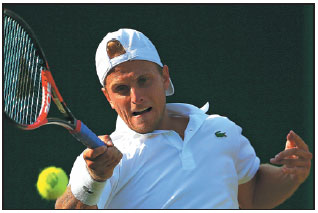It's far from a life of luxury
Journeymen pros face big challenges in making ends meet on tour
Aspiring tennis professionals are washing their shirts in hotel baths, sleeping on sofas and relying on crowd funding to chase their Grand Slam dreams.
That's a far cry from star players, who some fear could be fueling corruption in the sport.
Tennis was rocked on Monday following reports that authorities had failed to deal with widespread match-fixing, just as the Australian Open, the first Grand Slam tournament of the year, served off in Melbourne.
Experts said tennis was ripe for corruption due to the ease of fixing a one-on-one sport, as well as the large disparity between the multi-million dollar earnings of top players and the lower rungs of professionals, where even mundane costs like laundry add up.
"Hotel laundry was $10 a shirt and there was no other laundry, so I hand-washed everything," said American pro Denis Kudla, who balked at the cost at a hotel in the South Pacific island of Noumea.
"I filled up a bath and washed 30 pieces of clothing, then used anything I could to hang everything all over the place."
Kudla, now 69th in the ATP rankings, said he has never been approached about match fixing and was surprised by the reports.
While he now makes a comfortable living from the tour, many of his colleagues do not.
According to research conducted on behalf of the International Tennis Federation, almost 45 percent of the 13,736 players at all professional levels of the sport earned nothing from it in 2013.
Only about 10 percent covered their costs.
The research carried out by Kingston University in London, also found players ranked in the top 50, on average, earn more than $1 million a year on both the men's and women's tours.
Those ranked from 51-100 earn in excess of $200,000, while from 101-250 they average about $85,000.
For those players ranked from 251-500 the earnings drop away to just $16,000 a year.
The average cost just for food, travel, accommodation and equipment to play professional tennis in 2013 was $38,800 for men and $40,180 for women, the Kingston research found.
By comparison, US secondary school teachers earn about $59,000 a year, while journalists earn about $45,000 according to US Department of Labor statistics.
Costly pursuit
Even the best players take on average five years to make the top 100, where they can earn a living from the sport.
During that time, the majority are supported mostly by family, while small commercial endorsements and national federation grants help offset the costs.
New Zealand's top-ranked player, Finn Tearney, adopted a different approach.
The 25-year-old Tearney, now ranked No 366 in the world, opened an account on a crowd-funding website.
"It's just to cover my expenses," said Tearney, who turned professional in 2013.
"I'd say about $40,000 is a pretty accurate figure, but that doesn't includes coaching or trainers when you're back home.
"It definitely doesn't include a coach on the road with you, which all the top guys have."
While Tearney was not having to rely on the goodwill of friends to spend a week sleeping on a living room sofa, accommodation at many of the lower-level Futures tournaments was provided by local families who would billet the players.
Some of the second-tier Challenger tournaments now provide free accommodation until the player is knocked out, he said.
Lower levels
With many players struggling to make ends meet, former world No 31 Sergiy Stakhovsky used his place on the ATP Players' Council to lobby for increased prize money for players knocked out in earlier rounds.
At this year's Australian Open, a player losing in the first round will take home A$38,500 ($26,626) up from A$30,000 two years ago.
Extending the pool of money to the lower level tournaments, however, might not be the answer to the match-fixing issue, 17-time Grand Slam winner Roger Federer said.
"It doesn't matter how much money you pump into the system, there's always going to be people approaching players, or people, any sport," Federer said.
"It's going to go away if you offer $1 million for every player to play at every tournament? That's not going to change a thing."
|
Denis Kudla has resorted to creative measures to cut costs in order to remain on the tour. |






 3
3

















